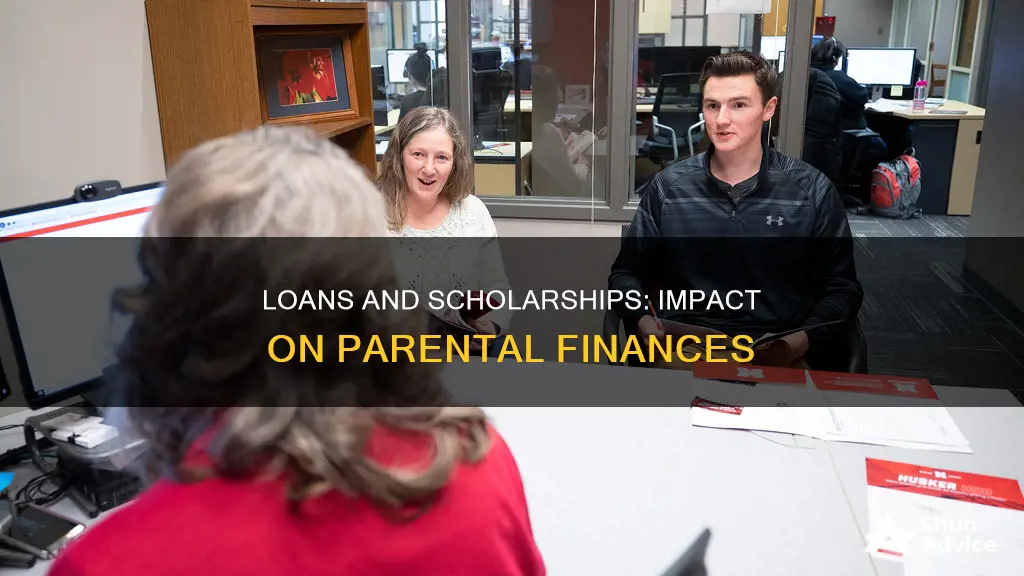
Parent PLUS loans are a federal loan program that allows parents or legal guardians of undergraduate students to pay for college. They are credit-based and provided directly to parents to help cover the costs of their student's college or career school. These loans are meant to supplement school, state, and other federal financial aid offered. However, they often come with higher costs and harsher consequences for defaulting on the loan. This has led many financial experts to discourage them as an option. So, does taking out a Parent PLUS loan affect a student's scholarship eligibility?
Does a Parent's Loan Affect Scholarships?
| Characteristics | Values |
|---|---|
| Parent's Credit History Affecting Student's Eligibility for Loans and Other Aid | A student's credit history is not affected by their parent's credit history. Eligibility for federal student loans does not depend on the parent's credit history. |
| Parent PLUS Loan | A Parent PLUS Loan is a federal education loan provided directly to parents of dependent students to help cover the costs of their student's college or career school. It is a good alternative to private student loans because they offer more flexible repayment options. |
| Impact on Student's Credit | A parent defaulting on a Parent PLUS Loan will not affect the student's credit history. |
| Impact on Parent's Credit | A parent defaulting on a Parent PLUS Loan will affect the parent's credit history. |
| Impact on Scholarships | A parent defaulting on a Parent PLUS Loan will not affect the student's eligibility for scholarships. |
What You'll Learn

Parent PLUS Loans vs. private student loans
Parent PLUS Loans and private student loans are two primary college borrowing options for parents. Here is a detailed comparison between the two to help you decide which option suits your needs:
Interest Rates
Parent PLUS loan interest rates are fixed and set by the government or the US Department of Education. On the other hand, private student loan interest rates can be fixed or variable, depending on the borrower's creditworthiness. Private loans may offer lower rates than federal PLUS loans for well-qualified applicants.
Fees
Both Parent PLUS loans and private student loans may come with fees, but the types and amounts of fees can differ. It is important to understand the fees associated with each loan type to avoid unnecessary costs. For example, an Ascent Parent Student Loan has no fees.
Loan Amounts
The loan amount for a Parent PLUS loan is limited to the full cost of the child's education, including tuition, room, and board. In contrast, private parent loan amounts can vary depending on the borrower's credit history.
Repayment Terms
Parent PLUS loans offer three repayment options: Standard Repayment, Graduated Repayment, and Extended Repayment. Private parent loans may also provide a range of repayment options, depending on the lender. For instance, Ascent's Parent Student Loan offers both Interest-Only and Immediate Full Principal & Interest (P&I) in-school repayment options.
Deferment Options
Parent PLUS loans offer federal protections such as in-school deferment and student loan consolidation to achieve income-contingent repayment. They may also be eligible for Public Service Loan Forgiveness. Private loans typically do not qualify for income-driven repayment plans or federal student loan forgiveness programs, but some private lenders may offer their own hardship programs, such as forbearance or deferment.
Credit Requirements
Parent PLUS loans have minimum credit requirements, and a credit check is performed to determine any late payments and recent defaults in an applicant's credit history. However, the interest rates for Parent PLUS loans are not dependent on the applicant's creditworthiness but rather on when the loan is borrowed. In contrast, private parent loan interest rates are based on the borrower's credit score, and a good credit score can help qualify for lower interest rates.
Private Loan Garnishment: What's the Deal in PA?
You may want to see also

Parent PLUS Loans and credit checks
Parent PLUS Loans, also known as Direct PLUS Loans, are federal education loans provided to parents of dependent students to help cover the costs of their child's college or career school. These loans are meant to supplement school, state, and other federal financial aid offered to the student. One key difference between Parent PLUS Loans and federal student loans is that a credit check is performed to determine any late payments and recent defaults in the borrower's credit history.
To apply for a Parent PLUS Loan, you must first fill out the Free Application for Federal Student Aid (FAFSA), where you will first see the option for this loan type. You can then apply directly online and sign the Master Promissory Note (MPN), which outlines your agreement to repay the loan. It is important to note that, unlike federal student loans, a credit check is required for Parent PLUS Loans. This means that your credit history will be reviewed to determine any late payments or recent defaults.
If you are concerned about your credit history or ability to qualify for a Parent PLUS Loan, you may consider adding an endorser. An endorser is similar to a cosigner for a private student loan. They are someone with a good credit history who agrees to repay the loan if the borrower defaults. Adding an endorser can increase your chances of approval, but it is important to consider the potential impact on your relationship if the loan is not repaid.
It is worth noting that Parent PLUS Loans are not the first option to consider when seeking financial assistance for a student's education. Scholarships, grants, and federal student loans should be maximized first. Parent PLUS Loans are intended to cover any remaining costs associated with the student's education. The loan amount can be awarded for up to the total cost of attendance minus any financial aid the student has already received.
O'Reilly's Loan Tools: What You Need to Know
You may want to see also

Parent PLUS Loans and scholarship eligibility
Parent PLUS Loans are federal education loans provided directly to parents of dependent students to help cover the costs of their child's education. They are meant to supplement school, state, and other federal financial aid offered.
To be eligible for a Parent PLUS Loan, you must be the biological parent, adoptive parent, or stepparent of an undergraduate student and not have an adverse credit history. Additionally, your child must be enrolled in an eligible degree or certificate program and be a U.S. citizen or eligible non-citizen.
Before completing the Parent PLUS application, your child must fill out the Free Application for Federal Student Aid (FAFSA). This form determines your child's eligibility to receive federal financial aid to help pay for school. Any aid your child qualifies for can reduce the amount you need to borrow through a Parent PLUS Loan.
When completing the Parent PLUS application, you can request to borrow the maximum you're eligible for, based on your child's cost of attendance and other financial assistance, or you can request a specific amount. It's important to remember that you must repay the full amount borrowed, so it may not be advisable to borrow more than necessary.
Parent PLUS Loans do not directly affect scholarship eligibility. Scholarships, grants, and federal student loans are typically considered first when determining a student's financial need. If the student has maxed out scholarships and other sources of financial aid but still needs additional funds for their education, a Parent PLUS Loan can be an option to cover the remaining costs.
Ondeck's Loan Ownership: Who Holds the Debt?
You may want to see also

Parent PLUS Loans and repayment options
Parent PLUS Loans are credit-based federal education loans provided directly to parents of dependent students to help cover the costs of their child's college or career school. They are meant to supplement school, state, and other federal financial aid offered.
Repayment options
Parent PLUS Loans offer fewer options and protections than other federal student loans. Repayment begins 60 days after disbursement. They are unsubsidized, which means they will accrue interest during deferment periods. The interest rate and origination fee are also higher than student loans.
If you want to defer payments until after your student graduates, you must contact the servicer. Out of all the income-driven repayment plans, Parent PLUS Loans only qualify for the Income-Contingent Repayment (ICR) plan. Enrolling in ICR requires you to consolidate your Parent PLUS Loans. The minimum payment on ICR is just $5.
Other repayment plan options for Parent PLUS Loans include Standard, Graduated, Extended, or Income-Contingent.
If you are unable to pay off the loan immediately, you have two options: rehabilitation and consolidation. Rehabilitation involves making nine months of reasonable payments (based on your income), after which your loan will be in good standing and the default note will be removed from your credit report. Consolidation, on the other hand, is a faster process that may be important if you want to regain eligibility for federal student aid, but the default will remain on your credit history.
It is important to note that Parent PLUS Loans do not qualify for all income-driven repayment plans and loan forgiveness programs. Consolidating your loan may make you lose progress towards loan forgiveness under PSLF or income-driven repayment.
Main Financial Refinance: Exploring One's Loan Options
You may want to see also

Parent PLUS Loans and retirement
Parent PLUS Loans are credit-based federal education loans provided directly to parents of dependent students to help cover the costs of their child's college or career school. They are meant to supplement school, state, and other federal financial aid offered. Parent PLUS Loans are not automatically forgiven when the borrower retires or draws Social Security benefits. However, there are several options available to alleviate the burden of these loans during retirement:
Income-Driven Repayment Plans
The government offers income-based repayment plans, such as the Income-Contingent Repayment (ICR) plan, which allows borrowers to make payments based on their income. After 25 years of qualifying payments, the remaining balance on the loan is forgiven. It is important to note that consolidating Parent PLUS loans is a necessary step to qualify for the ICR plan.
Public Service Loan Forgiveness
Parent PLUS Loan borrowers can have their debt forgiven after 10 years of working full-time for the government, non-profit, or other qualifying employers. Retired public servants could previously apply for retroactive credit towards the Public Service Loan Forgiveness Program (PSLF), but this waiver has ended. Now, borrowers must continue working in public service until they meet the eligibility requirements.
Disability Discharge
Borrowers who have a total disability can apply for a disability discharge, even if they are already retired. This requires submitting a letter from a doctor or the Social Security Administration supporting their claim.
President Biden's Debt Cancellation Plan
Under President Biden's debt cancellation plan, up to $20,000 of Parent PLUS Loan debt can be wiped out.
Transfer of Debt
As a last resort, borrowers can try to transfer the Parent PLUS Loan debt to their child or spouse. However, this requires the agreement of the child or spouse and they must demonstrate that their finances can cover the loan payments along with their other expenses.
Property Ownership: A Loan Advantage?
You may want to see also
Frequently asked questions
A Parent PLUS Loan is a federal education loan provided directly to parents of dependent students to help cover the costs of their student's college or career school.
No, a Parent PLUS Loan does not affect a student's eligibility for scholarships or other forms of financial aid.
No, a student cannot co-sign their parent's Parent PLUS Loan.
If your parents default on their Parent PLUS Loan, it will only affect their credit history. However, there can be harsh consequences, including wage and Social Security garnishment.







